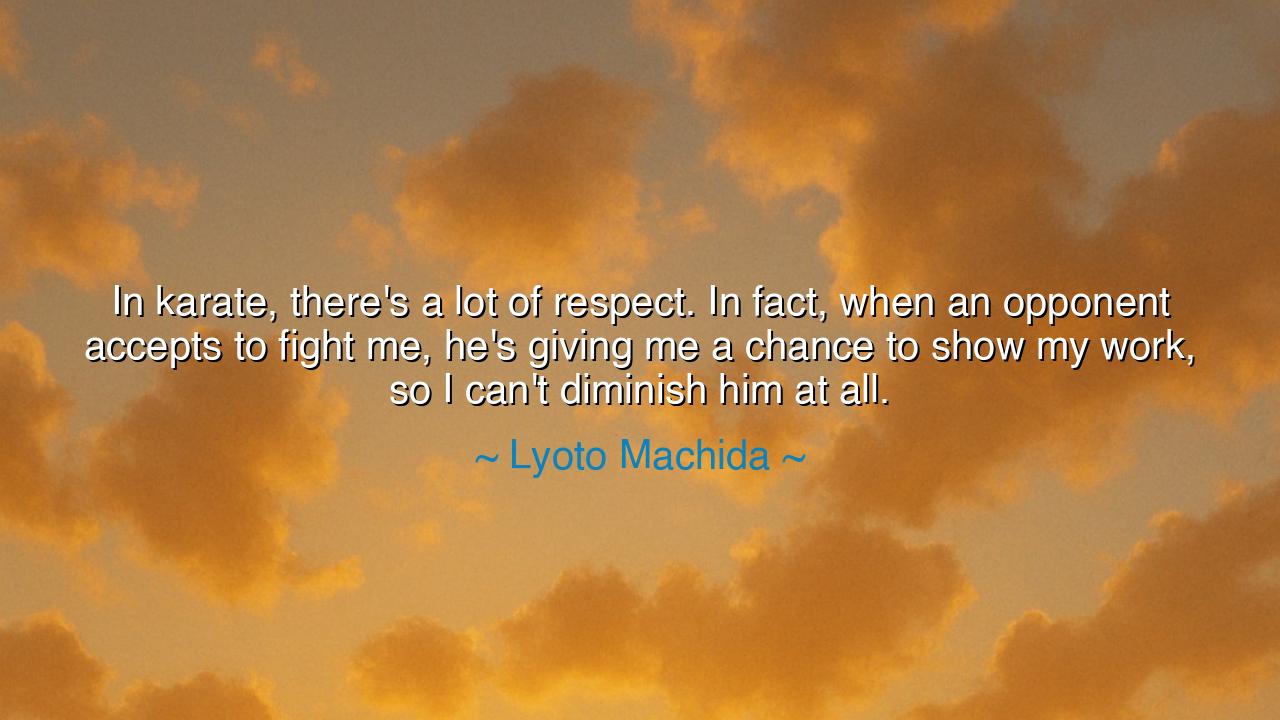
In karate, there's a lot of respect. In fact, when an opponent
In karate, there's a lot of respect. In fact, when an opponent accepts to fight me, he's giving me a chance to show my work, so I can't diminish him at all.






The words of Lyoto Machida—“In karate, there's a lot of respect. In fact, when an opponent accepts to fight me, he's giving me a chance to show my work, so I can't diminish him at all”—speak to a philosophy older than combat itself. Behind the discipline of karate lies not the hunger for domination, but the reverence for harmony, balance, and mutual growth. In his words, Machida reveals the warrior’s paradox: that the truest victory is not over another, but over oneself. The opponent is not an enemy to be crushed, but a partner in the sacred ritual of testing one’s spirit. Every duel is an act of respect, every clash a dialogue between two souls seeking truth through struggle.
In the tradition of the East, the martial arts were never born for conquest alone. Bushidō, the “Way of the Warrior,” taught that strength without respect was corruption, and that to dishonor one’s opponent was to dishonor oneself. The ancient masters of karate, from Okinawa to Japan, understood that the fight was but the surface of a deeper river—a path to discipline, humility, and enlightenment. When Machida bows before his opponent, he bows before the mirror of his own potential. The one who stands across from him is not merely a rival but a teacher, one who offers him the rare opportunity to refine his art. Without opposition, the warrior cannot evolve. Without challenge, the spirit cannot grow.
History tells of Miyamoto Musashi, the legendary swordsman who fought more than sixty duels and remained undefeated. Yet in his later years, Musashi wrote The Book of Five Rings and spoke of a higher wisdom: that the true battle lies within. He came to see every opponent as a reflection of his own imperfections, every clash as a chance to sharpen not only his sword but his soul. Like Machida, he understood that the act of combat, when done with respect, becomes sacred. The blade that cuts without hatred becomes a tool of understanding. The fist that strikes without malice becomes an offering of truth.
When Machida says that his opponent gives him “a chance to show my work,” he acknowledges that no warrior rises alone. Greatness is born through encounter—through resistance, through trial, through the courage of another who dares to meet you in the arena of life. To fight is to trust: each combatant must believe that the other will bring their full strength, their full heart, and in doing so, both are elevated. To diminish the opponent, to mock or despise him, would be to diminish the sanctity of the path itself. Honor is what separates the martial artist from the brawler, the warrior from the brute.
Even beyond martial arts, this truth endures in every field of human endeavor. The musician owes gratitude to the rival who inspires him to play better; the thinker owes respect to the critic who forces him to defend his ideas. In every struggle, visible or unseen, our opponents shape us. They awaken parts of us that slumber in comfort. When faced with challenge, we either rise or falter—but always, we learn. The wise see this and bow in gratitude, even to those who stand against them. For the true test of strength is not victory, but respect in the midst of battle.
There is a lesson here for all who seek greatness: never despise the one who challenges you. Whether it is a rival, a hardship, or an unexpected obstacle, each carries a hidden gift. As Machida teaches, the opponent’s acceptance of the fight is a gesture of faith—a shared commitment to the discipline of improvement. If you meet it with arrogance, you gain only a fleeting triumph. If you meet it with humility, you gain wisdom that endures. The warrior who respects his foe walks the narrow path between power and peace, and it is there, in that balance, that mastery is born.
The lesson of Lyoto Machida’s words, then, is timeless: respect is the soul of strength. Without it, even the greatest victories are hollow. But with it, even defeat can be honorable. To live as a warrior is not merely to fight, but to recognize that every encounter—on the mat, in the world, or within the heart—is an invitation to become better. When you face your next challenge, bow before it. See it not as an enemy, but as a teacher. For in the end, as Machida reminds us, the true art of karate—and indeed, of life—is not to conquer others, but to conquer the ego, and to walk forward with respect, grace, and gratitude.
So, my child, when you stand before your battles, remember: bow first, bow last, and fight only with honor. Let your opponent awaken your courage, not your cruelty. For it is through respect, not rage, that the spirit attains its highest form—and through every worthy struggle, the soul finds its way to peace.






AAdministratorAdministrator
Welcome, honored guests. Please leave a comment, we will respond soon